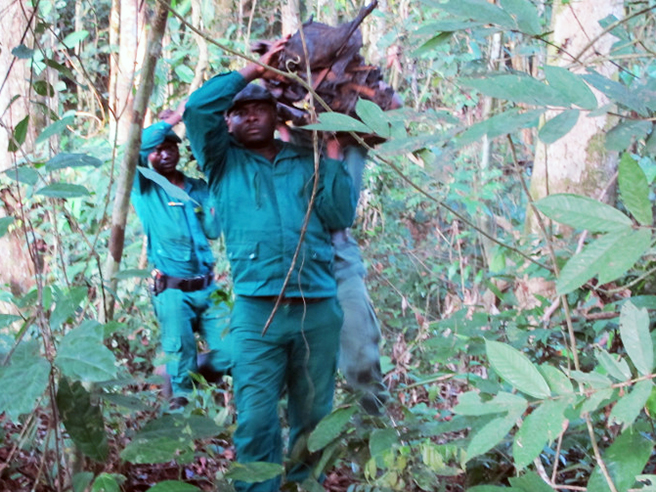Guarding the Heart of the Forest

In charge of ecological monitoring and biodiversity conservation at the Dja Biosphere Reserve in Cameroon, Roger Bruno Tabue Mbobda became an ecoguard because, quite simply, “I wanted to become a renowned environmentalist.” It is not an easy job, however. Tabue provides some insight into what it means to work and live on the front lines of the poaching conflict.
Q: Describe your average day on the job.
A: The weekly schedule entails forest patrols, motorized controls, land patrols and time in the office. Teams are formed according to the mission objectives. For patrols in the forest, the team runs the mission on foot, after which they return and produce a report within 48 hours. Patrols on the roads in the periphery of the park—where poachers often travel to export bushmeat to the markets—are conducted on a bike or by car. The fixed controls are at strategic points where circulation of hunting products is dense.
We also often conduct research and sensitization activities with the local populations, and special teams are made for this purpose.
Q: What happens during patrols?
A: Patrols are always in groups of at least three people. In the forest, we generally identify and destroy hunting camps and traps, while also seizing hunting equipment and products and arresting poachers. Data is also collected for signs of animal presence. Whether in the forest or on the road, we regularly face resistance, which can result in physical assaults, equipment vandalism, even murder.
Q: What are the greatest challenges of working as a ranger?
A: Our challenges include significantly reducing the pressure on this protected area and improving working conditions for the ecoguards, through housing, equipment and more. Currently there is not a reward system for the ecoguards apart from the risk premium of US$30 paid monthly, so motivation can be low.
The other challenges include communities working with poachers, well-connected people in the country who are helping to fund poaching and the expansion of logging, mining and agribusiness, which has created a population boom in the area.
Q: How has AWF’s support impacted your work?
A: AWF’s support helps us couple our anti-poaching efforts to ecological monitoring. We have been able to modernize the quality of data collection and management by using CyberTracker, which is now linking up to the Spatial Monitoring and Reporting Tool (or SMART). This tool allows us to put in place a database on the presence of animals and humans. Today, information on wildlife and human activity within the reserve are well known, and quantitative descriptions are readily available. All of this has a positive impact on wildlife. With many trainings and materials that AWF’s support has brought since 2013, we are able today to independently carry out many conservation activities and spontaneously react to threats against our protected area.